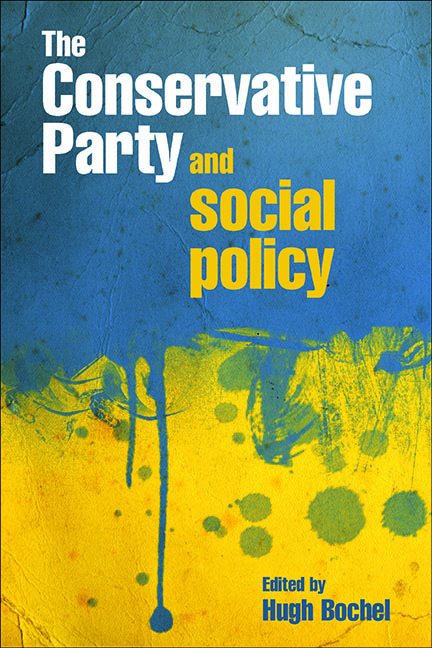Book contents
- Frontmatter
- Contents
- Notes on contributors
- one Conservative approaches to social policy since 1997
- two The Conservative Party and the welfare state since 1945
- three The Conservative Party and public expenditure
- four The Conservatives, social policy and public opinion
- five Conservative health policy: change, continuity and policy influence
- six Something old, something new: understanding Conservative education policy
- seven Conservative housing policy
- eight Social security and welfare reform
- nine A new welfare settlement? The Coalition government and welfare-to-work
- ten The Conservative Party and community care
- eleven Conservative policy and the family
- twelve Crime and criminal justice
- thirteen The Conservatives and social policy in the devolved administrations
- fourteen The Conservatives and the governance of social policy
- fifteen The Conservatives, Coalition and social policy
- References
six - Something old, something new: understanding Conservative education policy
Published online by Cambridge University Press: 01 September 2022
- Frontmatter
- Contents
- Notes on contributors
- one Conservative approaches to social policy since 1997
- two The Conservative Party and the welfare state since 1945
- three The Conservative Party and public expenditure
- four The Conservatives, social policy and public opinion
- five Conservative health policy: change, continuity and policy influence
- six Something old, something new: understanding Conservative education policy
- seven Conservative housing policy
- eight Social security and welfare reform
- nine A new welfare settlement? The Coalition government and welfare-to-work
- ten The Conservative Party and community care
- eleven Conservative policy and the family
- twelve Crime and criminal justice
- thirteen The Conservatives and social policy in the devolved administrations
- fourteen The Conservatives and the governance of social policy
- fifteen The Conservatives, Coalition and social policy
- References
Summary
Since the Thatcher era, Conservative education policy, like many areas of Conservative policy, has been fraught with tensions. Looking back over 30 years conjures memories of some familiar figures and contradictions. We remember Keith Joseph and his neo-liberal zeal over freedom for schools and vouchers for parents, but we also remember Kenneth Baker and his introduction of a prescriptive National Curriculum with national testing at age seven or indeed Kenneth Clarke, his abolition of HMI and his creation of Ofsted in an unprecedented shift in relations between government and the educational establishment. As far back as 1998, William Hague sought to disassociate his party from past perspectives, arguing that ‘there is such a thing as society’ (Rafferty, 1998b). However, Gillian Shephard told us that policy on education should not concern itself with class-envy ‘dogma’ because such is the enemy of ‘excellence’ (Hansard, 2 June 1997, cols 28–9).
On the one hand, within Conservative education policy a belief in markets and a minimal state, basic tenets of neo-liberalism, have meant a push for privatisation, the ‘liberation’ of schools to innovate and diversify, and an enhanced role for parents as consumers in an educational marketplace. On the other, strong distrust of a ‘left-wing’ teaching profession, coupled with firm Conservative beliefs in ‘real subjects’ and that ‘the old methods are the best’ when it comes to teaching, discipline and the curriculum, have meant the imposition of strong accountability measures, detailed instruction over what should be taught in schools and a great deal of surveillance imposed from above. Conservative education policy is also associated with a strong view that the route to tackling poverty and educational underachievement lies in greater personal responsibility. Where pupils succeed, it is thanks to ability, hard work and traditional teaching methods. Where they fail, it is because they, their families or their teachers have not tried hard enough, or have come under the influence of misguided progressivism. A long history of individualisation and decontextualisation of educational success and failure within the Conservative Party – despite academic research linking educational attainment and deprivation – has lent legitimacy to support for private and selective schooling, evidenced by past Tory initiatives such as the Assisted Places Scheme (subsidising private schooling for high-achieving non-privileged pupils), and periodic calls for a return to selection.
- Type
- Chapter
- Information
- The Conservative Party and Social Policy , pp. 97 - 118Publisher: Bristol University PressPrint publication year: 2011
- 2
- Cited by



